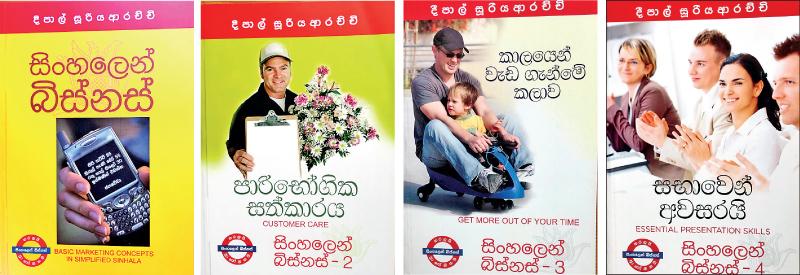Wednesday Feb 18, 2026
Wednesday Feb 18, 2026
Thursday, 15 July 2021 00:00 - - {{hitsCtrl.values.hits}}


 Every time I see those girls who sell flowers in front of our temples it is nearly impossible not to think how Deepal Sooriyaarachchi used the simple sale of flowers to describe the four ‘P’ s of Marketing; Product, Price, Place and Promotion. Deepal launched his first book Sinhalen Business 20 years ago and it is opportune to review his contribution in retrospection.
Every time I see those girls who sell flowers in front of our temples it is nearly impossible not to think how Deepal Sooriyaarachchi used the simple sale of flowers to describe the four ‘P’ s of Marketing; Product, Price, Place and Promotion. Deepal launched his first book Sinhalen Business 20 years ago and it is opportune to review his contribution in retrospection.
The publications of Deepal Sooriyaarachchi, a name synonymous with authoring the ‘Sinhalen Business’ book series, has received immense popularity amongst a vast audience over the last two decades.
Sinhalen Business was first launched in year 2000 in an era where there was a dearth for knowledge in marketing concepts amongst the Sinhala-speaking public. To date, the first book of the series titled Sinhalen Business is considered the most comprehensive book on marketing ever published in simple Sinhala. The success of this book was evident with its transformation into a handbook amongst many who were interested to learn about ‘marketing’ with true to life examples in the language closer to their hearts.
This inspired the author to follow with a series of books under the main title of ‘Sinhalen Business’ namely; Paribhogika Sathkaraya (Customer Care) Kalayen Weda Genime Kalawa (Time Management) Sabhaven Avasari (Presentation Skills) Sevaka Sampatha (How to recruit and Train) Nayakathwaya (Leadership) Rekiyawai Obai (How to succeed in a job) Sihiyen Sitima (Mindfulness) and Rakshana Upadeshakavarayaneni (Life Insurance Sales).
The uniqueness of Deepal’s books was his ability to present facts; (a) in concise chapters that could be absorbed in one go (b) creating visuals with rhyming, memorable poetic lines which are easy to understand (c) and finally explaining deep marketing concepts in a very simplified form so that even a non-marketer was able to grasp the ideas very well.
Moreover, his ability to drive marketing concepts by creating connections with Sinhala words was a remarkable feature of his writing. For example, he was instrumental in coining the term ‘Paribhogika Sathkaraya’ for the term ‘Customer Care.’ A word ‘Sathkaraya’ in Sinhala gives a deeper meaning, in our behaviour; where one does something to another whole heartedly. The word – ‘Sathkaraya’ we had been using as ‘Aganthuka Sathkaraya’ where, in our culture, we often say even the enemy who comes to your residence should be well treated with utmost care.
Furthermore, introduction of this word ‘Paribhogika Sathkaraya’ subsequently became a common phrase in business communication and training programmes in Sri Lanka amongst the Sinhala speaking business fraternity. Today ‘Paribhogika Sathkaraya’ is the accepted Sinhala term for ‘Customer Care’.
One need a deep appreciation of the language and the core concept to coin such phrases. He also popularised the term ‘San Namaya’ for ‘Brand’ by using the same root of the word to brand- that is to burn a sign on an animal for recognition purposes. Similarly burning the owner’s initials on cattle is called ‘hana gahanawa’ where ‘hana’ is easily converted to San and also San connotes the word ‘sanna’ used in Buddhism to connote Perception.
When writing Sinhalen Business Deepal had not tried to translate English words but instead strived to explain the concept. Yet he had given a glossary at the end of the book for academic and technical usage.
For instance, instead of trying to give a single word for ‘Positioning’ he has explained that as taking ‘a place in the mind’ (Hithe thenak laba ganma). To introduce the concept of ‘Market Segmentation’ he asks the question whether one would grab the whole heap of oranges or a few; what a simple yet powerful way to communicate.
Deepal was an accomplished advertising person and the headlines of almost all the chapters bring out the copy writer in him. Those head lines are so captivating and engaging; ‘lissala yanna nodena sirasthala’, ‘nama wata kara hitha bandeema’, ‘kavuda raja’, ‘kerapoththan weni paribhogikayan’ are a few of such headlines.
In discussing various strategic planning matrixes such as BCG Matrix and Ansoff Matrix Deepal presents them as different windows to look at a business, thus takes out the abstractness of the whole proposition.
Once Dr. D.V.J. Harischandra referred to Deepal’s Sinhalen Business book on ‘Leadership’ as “a book on leadership which is applicable to the Sri Lankan context”. Furthermore, he mentioned that even he had a great learning experience and gave references to some of Deepal’s practical examples in one of his TV presentations.
On another occasion, late Sybil Wettasinghe, the world-famous children’s author and illustrator said how even she found Sinhalen Business books enjoyable reading with a lot of lessons to learn.
As mentioned above Deepal’s books are written in such a simple and captivating language they appeal to a very wide cross section of readers. Once I met a security officer in a Garment Factory who was reading ‘Kalayen wada ganime kalawa’ book of the Sinhalen business series. This officer said that he used to purchase every month a book written by this author for the reason been that it had made a positive impact on his life. Even in my own training career, Deepal’s book ‘Sabhawen Avasari’ on presentation skills has been a hand book to me over the years.
Although, two decades have passed since the first book in the series was published, the knowledge shared is yet very much current and a worthy read for all aspiring professionals in whatever they do. Often rarely we find any books written in Sinhala language giving more emphasis to local scenarios. Deepal has had over four decades of experience; starting his career from a grass root level and climbing up the ladder to hold mostly C-suite positions in the corporate sector for so many years. Moreover, today he is holding many directorships in leading companies in Sri Lanka.
In the penultimate chapter of Sinhalen Business he identifies several opportunities where marketing concepts can be used at national levels. In the first edition he suggested to issue loyalty cards to tax payers, and this is now in place.
His vast experience of course had influenced him to bring about the relevance between business theories and its direct applicability to the local context, making his publications to be more pragmatic. I am of the firm view that this series of books will continue to serve the nation by enhancing the productivity of our people now and into the future.
In the cover of the first edition of Deepal’s Sinhalen Business there was an icon depicting a super market cart and an arrow to a computer mouse. This illustrated the future of the business which author was in a position to predict twenty years ago which had become a reality today.
The Sinhalen Business series is now presented as Sarasavi Publications and available at all leading bookstores and through the Sarasavi website.